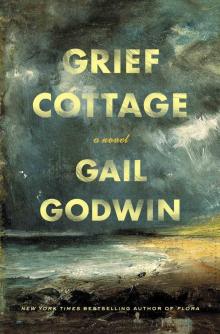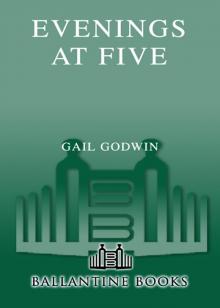- Home
- Gail Godwin
Old Lovegood Girls
Old Lovegood Girls Read online
William Iredell Godwin
1905–1977
Generous Uncle
Sit Tibi Terra Levis
(May the earth lie lightly upon thee)
BY THE SAME AUTHOR
NOVELS
Grief Cottage (2017)
Flora (2013)
Unfinished Desires (2009)
Queen of the Underworld (2006)
Evenings at Five (2003)
Evensong (1999)
The Good Husband (1994)
Father Melancholy’s Daughter (1991)
A Southern Family (1987)
The Finishing School (1984)
A Mother and Two Daughters (1982)
Violet Clay (1978)
The Odd Woman (1974)
Glass People (1972)
The Perfectionists (1970)
STORY COLLECTIONS
Mr. Bedford and the Muses (1983)
Dream Children (1976)
NONFICTION
Publishing: A Writer’s Memoir (2015)
The Making of a Writer: Journals, vols. 1 and 2 (2006, 2011) edited by Rob Neufeld
Heart: A Personal Journal through Its Myths and Meanings (2001)
Too Deep for Words
Contents
Part One
Chapter One
Chapter Two
Chapter Three
Chapter Four
Chapter Five
Chapter Six
Chapter Seven
Chapter Eight
Chapter Nine
Chapter Ten
Chapter Eleven
Chapter Twelve
Chapter Thirteen
Part Two
Chapter Fourteen
Chapter Fifteen
Chapter Sixteen
Chapter Seventeen
Chapter Eighteen
Chapter Nineteen
Part Three
Chapter Twenty
Chapter Twenty-One
Chapter Twenty-Two
Chapter Twenty-Three
Chapter Twenty-Four
Part Four
Chapter Twenty-Five
Chapter Twenty-Six
Chapter Twenty-Seven
Chapter Twenty-Eight
Chapter Twenty-Nine
Part Five
Chapter Thirty
Chapter Thirty-One
Chapter Thirty-Two
Chapter Thirty-Three
Chapter Thirty-Four
Chapter Thirty-Five
Chapter Thirty-Six
Chapter Thirty-Seven
Chapter Thirty-Eight
Chapter Thirty-Nine
Chapter Forty
Chapter Forty-One
Chapter Forty-Two
Chapter Forty-Three
Chapter Forty-Four
Chapter Forty-Five
Chapter Forty-Six
Chapter Forty-Seven
Chapter Forty-Eight
Chapter Forty-Nine
Chapter Fifty
Chapter Fifty-One
Acknowledgments
A Note on the Author
PART ONE
1
1958
The dean and the dorm mistress stood brooding over the student housing plans laid out on the rosewood conference table. It had been a parching August, happy news only for the tobacco growers transporting their precious harvests from the fields to the curing barns. The tall sash windows of the old building, lowered and raised from top and bottom, failed to entice a flutter of air. The sheer net curtains hung as still as in a painting. The dean had prohibited grass mowing and faculty showers until the day before the girls arrived on campus.
“Maybe we could put her in the Lanier room, with Eskew and Linzey,” suggested the dorm mistress. “Back in ’48 when we had a full house again, we fitted three beds and dressers into Lanier, and those girls hit it off so well they ended up serving as one another’s bridesmaids.”
Despite the sapping heat, Winifred Darden, dorm mistress at Lovegood College for thirty-one years, displayed the ramrod posture of a woman born in the last century—which indeed she had been, though midpoint in her tenure at Lovegood College she had moved her birth across the dividing line. (“Don’t you dare tell a soul, but I am the same age as this century!” she gaily fibbed to each new crop of girls.)
“I somehow can’t see either Eskew or Linzey asking Feron Hood to serve as a bridesmaid,” said the dean.
“Well, as you know, I wasn’t on campus that day and didn’t get to meet her and give her the tour. What was your impression of her?”
Susan Fox paused to assemble her answer. Beginning her second year as dean of Lovegood College (though some continued calling her the new dean), she still had not become fluent in the southern art of evasive overlay. “At Saxon Hall, we had a teacher who would throw herself off a cliff before saying something negative about a student. The worst thing she allowed herself was, ‘So-and-so is not forthcoming.’ That phrase kept beating through my head while interviewing Feron Hood and her uncle.”
“Not forthcoming,” Miss Darden helpfully repeated. “And by that you mean …?”
“I had to guess, from the little her uncle told me, that she was … well, that she had been subjected to a wider range of life’s misadventures than our typical Lovegood girl.”
“I see,” said the dorm mistress, who didn’t exactly. “Perhaps we might … that little annex next to the infirmary that Mr. Sikes converted into a single room in case of a quarantine …?”
“The last thing a knocked-about girl like Hood needs is to feel quarantined. She needs a positive, steadying influence. I had the idea of pairing her with Jellicoe.”
“But Jellicoe’s already in with Chasteen! A perfect match. Both fathers are in farming.”
“But the purpose of college, after all, isn’t to settle down with a carbon copy of yourself. We could switch Chasteen to the Lanier room. As you pointed out, it’s spacious enough for three. Eskew and Linzey are second-year girls. They’re old news to each other. They’ll make a pet of pretty little Chasteen.”
“But if Hood has been knocked about and isn’t very forthcoming—I mean, Jellicoe struck me as such a positive girl. She knows how to appreciate things. When I was giving her family the tour, I was about to show them our new wing with the modern rooms, but Jellicoe said she liked the high-ceilinged old rooms. Her mother asked if they shouldn’t at least see what the new wing had to offer, but Jellicoe said, ‘No, I like the way more has happened here in this old part, you can feel it.’ That is insightful for an eighteen-year-old, don’t you think?”
“They might benefit each other. When I was headmistress at Saxon Hall, each girl was allowed to bring one horse. Just one. The rule had been written in stone since the founding of the school. Then this desirable girl we really wanted insisted her horse couldn’t be separated from its companion pony. The horse was a skittish thoroughbred, and the pony kept it calm. I made an executive decision, and we got the girl and the horse. And the pony of course. It worked out well.”
Not quite sure which girl was meant to represent the thoroughbred and which the pony, the dorm mistress asked the dean if she could elaborate a little on Feron Hood’s misadventures.
“Her uncle telephoned and asked for an interview. It was all very last minute, as you know. He’s a lawyer down in Lauren County. The niece had simply showed up at his office. Walked across town from the bus station with her suitcase and asked if he would take her in. He had no idea who she was.”
“He didn’t know his own niece?”
“He had never met her. She was his late brother’s child from a very short marriage. The couple divorced soon after the baby was born. There was no contact until the next husband petitioned to adopt the child. Since his
brother had recently died, the uncle handled the matter. Then years went by. The mother had died of a fall, and the girl blamed her stepfather and caused quite a scandal. But she reversed herself at the inquest and continued to live with him for several months before she ran away. She stopped in Chicago for a short time, sleeping in the park, and then decided to head south to the uncle.”
“So she knew she had an uncle.”
“The mother must have told her if things got impossible, they might throw themselves on his mercy. From what Hood told her uncle, it was not a happy home.”
“I wonder why the uncle picked Lovegood College.”
“Oh, his grandmother was one of Lovegood’s earliest students.”
“Really! What was her maiden name?”
“It was Seawell, or Sewell. I made a note of it. But while they were here for the interview, I forgot to follow up on the grandmother, I was so intent on studying the girl. She was polite but said no more than she was asked. I got the sense she was being very careful until she was sure she had been accepted.”
“I will go through the old records,” said Winifred Darden happily. “That means Hood will be eligible for the Daughters and Granddaughters Club. That should provide her with some ballast. We’ve kept everything, you know, even the first yearbooks, which were stitched together by hand.”
“There’s a problem with transcripts. She ran away before finishing high school. I told them we would work it out.”
“Will she be coming as a full-tuition student?”
“You bet your sweet life. And he’s paying extra for tennis lessons.”
What would it be like, Susan Fox wondered, to move into a school building at thirty and find yourself still living in it at sixty-two? Darden, the dorm mistress, was not a secretive person and had dropped a discreet crumb-path of self-history for the attentive person to follow. Here was a case of a poor, well-born girl reaching marriageable age just as the young men were leaving for World War I, earning her keep by living with rich people and taking care of their children until Lovegood College decided it needed a live-in dorm mistress. Winifred Darden was recommended by a family friend who was a Lovegood trustee. When the student body shrank by half during the Depression, the dorm mistress made herself indispensable in other ways, and by the time the Depression was over, she was going on forty. (“I still wake up and thank my stars for this solid roof over my head, not to mention my beautiful living quarters.”)
Making the most of her scant bounty, whereas ambitious Susan Fox, fortunate in all but the well-born start, prospered in her era until she brought the roof down on herself.
“We will all do our part to make it work out,” assured the dorm mistress.
“The world is fast-changing all around us, Winifred. In the next ten years, who knows where things will be? Let’s hope and plan that we can accommodate the spirit of change without forfeiting Lovegood’s values.”
“Oh, Lord, in 1968 I will be seventy-two,” moaned Winifred Darden, neglecting in the moment to remember she had shaved four years off her age.
2
Throughout her long life, Feron Hood never could describe to her own satisfaction what she had felt when she first saw Meredith Grace Jellicoe. Entering the room, Feron had seen a girl facing the window, intent on some small black object she held in her hand. Sensing a presence, the girl turned, snapped the object shut, and lit up as though the exact person she wanted had just come through the door.
“Are you Feron?” she asked. “I saw you down in the parking lot. You were getting your luggage out of the car. What a shame you missed my mama and brother by about two minutes.”
“I saw a woman with a boy. He was sliding down the bannister as I came up.”
“That was Ritchie! He was threatening to do that. I’m Merry, your roommate. Which bed would you prefer, window or corner?”
“You got here first. You should be the first to choose.”
“I haven’t sat down on either bed. I waited so we could choose together.”
“Actually, I’d prefer the bed in the corner.”
“Really? You wouldn’t rather have the bed next to the window?”
“I’m partial to corners.” (From the corner, you could see who was coming through the door before they saw you.)
“Well. If you’re sure.” The girl stepped forward and showed a small black compass. “This is on loan from my little brother, his prized possession. I guess he thinks I need it more. It’s an air force compass from World War II. He knows I get homesick, so he showed me how, since this window faces west, I can figure out exactly how our house in Hamlin will be facing me.”
Feron must have said something. Or maybe she didn’t. After the roommates became close, Merry confided, “You know, Feron, when I say something and you don’t answer, I always worry I’ve done something to make you mad.”
She was slim and petite and exhibited a quality of—in-one-piece-ness, if that could be a word. Everything was contained in her. As though God, when making her, took great pains to color all of her inside the lines. Her honey-blonde hair was cut shoulder length, and her features were well-proportioned. She could be called pretty, except her nose was too long. Feron was not inside the lines, was tall enough to have cultivated a stoop, and thought of herself as not unattractive but far from pretty.
The roommates unpacked their belongings, which in the meantime had been carried up by Mr. Sikes, a ropey, ageless man. Now they were making their beds.
“Did you come far today?” asked Merry.
“Only from Pullen.”
“Oh, that’s right. You live with your uncle in Pullen. Miss Darden told me.”
And no doubt told you a lot else as well, thought Feron, who had been briefed about Meredith Grace, the lovely girl from the prosperous Jellicoe Tobacco family, after Miss Darden had pounced on her and her uncle at the entrance and lured them into the reception parlor. Then the ethereal old biddy had produced an ancient hand-sewn yearbook, and Uncle Rowan was visibly moved, lingering over his grandmother’s class photo from 1875 until he had to rush off to a lunch engagement at the Walter Raleigh.
“As a matter of fact,” Feron said, “I was born in Pullen. My mother met my father there.”
“Miss Darden said you had recently lost your mother. I hope you don’t mind my bringing it up. I can’t even imagine losing a mother. Had she been sick, or—”
“No, she fell and hit her head against the radiator. I came home from school and found her.”
Bare facts, heavily edited. That’s what you did. Starting over on a clean page with every new person you meet.
“Oh, Feron. I am so sorry. I love your name. Is it from family, or …”
“It was from some actress in a movie. My mother liked the sound of it. She wasn’t sure of the spelling. It turns out there’s a village in Ireland named Farran, but we didn’t know that. It was a man who sat next to me on a bus just recently who told me about the Irish village. What about your name? Does anybody call you the whole thing?”
“It varies. Daddy’s manager calls me ‘Miss Meredith.’ My brother Ritchie calls me ‘Merry Grape’ because it makes him laugh. When Daddy is being stern, he does the whole Meredith Grace thing. But I’m used to Merry. I hope you’ll call me that.”
Squaring the corner of her bottom sheet, Feron felt her stepfather, Swain, materialize just behind her right shoulder. “That sheet has to be tight enough to bounce a quarter off of.” When she was little, it had sounded gently instructive, like he was sharing special army lore with her. When she was older, he began lying in wait, hoping to catch her making a mistake. His voice came from lower in his throat when his corrections took a derogatory dive. “Slovenly corners. What did I say about the quarter? You don’t listen.” Slovenly, slatternly, blowsy, hitty-missy. Sluttish, when he wanted to lay on the disgust. He had liked her better before she showed signs of turning into a woman. At which point he started tormenting her in a new way.
3
To acquain
t incoming students with its traditions and bind them into the community, Lovegood College put on an orientation pageant in the school chapel. New girls were seated in the front pews, the lights went out, the music teacher launched into Lovegood’s processional hymn, “How Firm a Foundation,” on the big pipe organ, and up the aisle marched pairs of second-year girls with lighted candles, belting out the stirring verses. They parted into single file at the front of the chapel and returned down the side aisles to take their seats, except for the ones hurrying backstage who were going to be in the pageant.
… I will not, I will not desert to its foes;
That soul, though all hell shall endeavor to shake,
I’ll never, no, never, no, never forsake.
Feron, acquainted with few hymns in her lifetime, was knocked sideways by the final verse. She turned away quickly to hide her loss of control from Merry in the next seat, but Merry was already snatching up her hand and protecting it in both of hers. A watchful, affectionate roommate would naturally assume that she was thinking of her lost mother, but actually Feron was grieving and yearning for something she couldn’t put a name to.
Next came the drama of the school’s genesis. Miss Elizabeth McCorkle, the history teacher, who wrote and directed the pageant, also played the part of the founder. Horace Lovegood, successful businessman and ruling elder of the Presbyterian Church, clad in top hat, double cravat, frock coat, and striped trousers, hustled about town, raising money to build a female two-year college on twenty acres he had donated.
The stage then emptied of donors, leaving only Horace Lovegood sharing his dreams with a top-hatted friend: he envisioned a female institute that would meet the requirements of young ladies like his brilliant young sister, had she not succumbed to typhus.
“I want a learning place for young women where they can partake of the same substantial branches of knowledge that their brothers consider a birthright. Of course we’ll teach the elegant and ornamental arts as well.”
As he spoke the lines, a scrim curtain rose to reveal a painted backdrop of the Lovegood building, much as it looked today, complete with the four-story Doric columns and gracious landscaping. An offstage pitch pipe sounded a note, and a trio of unseen a cappella voices chanted Horace Lovegood’s ambitious plan of study for his young women, each verse concluding with the refrain:

 The Making of a Writer
The Making of a Writer The Making of a Writer, Volume 2
The Making of a Writer, Volume 2 Old Lovegood Girls
Old Lovegood Girls Flora
Flora Publishing
Publishing The Finishing School
The Finishing School Grief Cottage
Grief Cottage Evenings at Five
Evenings at Five Unfinished Desires
Unfinished Desires